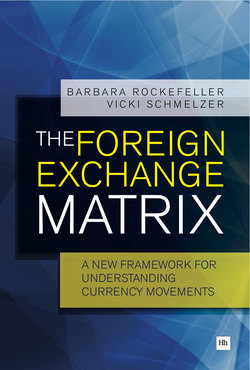Читать книгу The Foreign Exchange Matrix - Barbara Rockefeller - Страница 6
На сайте Литреса книга снята с продажи.
Easy answers What is the purpose of FX trading volume?
ОглавлениеThe FX market is so big because accounting convention allows it to be largely hidden. FX is a contingent asset/liability on the balance sheet of both banks and corporations, and is reported only in the footnotes of financial statements. Even then, FX is lumped together with “other securities.”
Further, the FX market is so big also because FX is a market dominated almost entirely by private speculators, including banks and hedge funds, who are trading almost entirely on private credit. The positions are not reported, nor are the credit lines backing the trading. You will search in vain for a number representing the gross credit lines of any bank to other banks for the purpose of FX trading.
FX trading outcomes are reported on the income statement, but do not have to be broken out from other securities trading. You will never discover how much profit Citibank, Deutsche Bank or Goldman Sachs made last quarter trading FX. And because FX traders are not burdened like equity and bond traders by having to meet a benchmark rate of return, relative performance among competitors is not in the public eye. FX traders have only cash profit targets and sometimes these are the bare minimum to justify the expense of the desk, quote terminal and telephone.
Finally, FX traded by institutions is not directly regulated by governments, although retail trading by individuals is usually regulated. FX escapes new efforts at regulation, as in exemption of FX derivatives in the US during 2010 and 2011, because self-regulation actually works, and works with impressive efficiency. This is in part because FX is a market on the leading edge of technology advances. We have not had a global problem due to FX since the Herstatt Bank failure in 1974, which was even then actually a credit risk issue and not strictly an FX issue. In essence, Herstatt accepted FX payments due to it and then declared bankruptcy, avoiding paying out its side of the FX trades. Note that credit risk always starts with the character of the counterparty.
